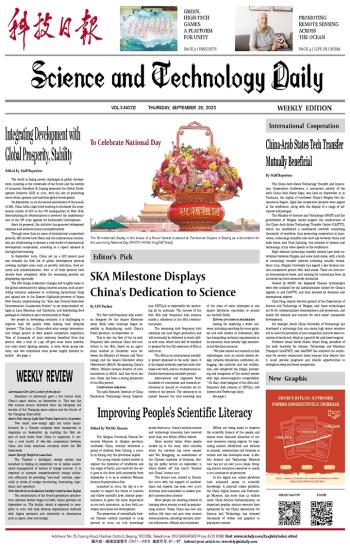
 Promoting Remote Sensing Across the Ocean
Promoting Remote Sensing Across the Ocean Green, High-tech Games: A Platform for Unity
Green, High-tech Games: A Platform for Unity Integrating Development with Global Prosperity, Stability
Integrating Development with Global Prosperity, Stability To Celebrate National Day
To Celebrate National Day China-Arab States Tech Transfer Mutually Beneficial
China-Arab States Tech Transfer Mutually Beneficial SKA Milestone Displays China's Dedication to Science
SKA Milestone Displays China's Dedication to Science WEEKLY REVIEW
WEEKLY REVIEW New Graphic
New Graphic Improving People's Scientific Literacy
Improving People's Scientific Literacy
 |
| Professor Werner Alpers is interviewed by S&T Daily during the 2023 Dragon 5 Symposium in China. (PHOTO: ZHOU Weihai/S&T Daily) |
The Dragon Program, launched by China's Ministry of Science and Technology (MOST) and the European Space Agency (ESA), is the platform with the largest number of personnel in China-EU remote sensing cooperation.
When the Dragon Program started in 2004, Werner Alpers, renowned oceanographer and professor emeritus at University of Hamburg, Germany, became its lead professor from Europe in the field of ocean and coastal zones. As an incubator and co-founder of the initiative, he has been nurturing young scientists from both China and Europe and has played a significant role in promoting ocean remote sensing.
In 2007, Professor Alpers won the Qilu Friendship Award from Shandong provincial government, and one year later, Alpers received the Chinese Government Friendship Award for his contribution to promoting international cooperation and outstanding contributions to China's modernization.
In an exclusive interview with Science and Technology Daily at the 2023 Dragon 5 Symposium held in Hohhot, north China's Inner Mongolia autonomous region, in September, Alpers talked about his expectations for the Dragon Program and his bond with China.
The transformation of China
Alpers first visited China in 1986 and has been developing long-term stable scientific cooperation with Chinese scientists since 1990.
A witness to the achievements of China's reform and opening-up, he recalled his first visit to Beijing. What impressed him most was the bicycles in the streets. "There were few cars in the streets of Beijing at that time, and the streets had few lights at night," he reminisced. There was no subway and the bus was the only means of public transport to go to the Beijing Friendship Hotel, where he stayed. But today there are large and sophisticated subway networks in major Chinese cities, which have been constructed in a record short time.
Sweeping changes have taken place in China. The achievements of the Chinese government and the people are unprecedented in human history. But many people who have not visited China recently don't realize it, Alpers added.
A deep sci-tech bond with China
As the founder of the Satellite Oceanography Laboratory of the University of Hamburg and a scientific advisor to three of the ESA's satellite programs, Alpers is recognized as an authority in the field of ocean remote sensing. His academic bond with China began when Chinese students joined his research team.
"When I became a professor in 1985, the government granted me funds for scientific research, but there weren't enough researchers in my team. An American friend, a professor in oceanography, recommended Chinese students to me, and that's where my story with Chinese sci-tech careers began," he said.
Being a frequent visitor to China during the past decades, Alpers has built a deep relationship with the Ocean University of China (OUC). Since 1999, he has been a visiting professor at the OUC, addressing more than 5,000 faculties and students there.
The international ocean remote-sensing advanced training program jointly initiated by Alpers and the OUC within the framework of the Dragon Program plays a major role in ocean remote-sensing research in Asia, especially in China. Some American experts have also expressed a desire to participate in it.
In addition to these contributions, Alpers has also been instrumental in the cultivation of talents in the field of ocean remote sensing in China. Through a Sino-German cooperation program, Chinese doctoral students went to the University of Hamburg on research visits, and some of them became the young academic backbones of Synthetic Aperture Radar (SAR) ocean observation in China.
Great expectations from young scientists
The fifth term of the Dragon Program will conclude in 2024, to be followed by the start of the sixth edition of the program. Alpers has great expectations for the future generations and high hopes for future cooperation between China and the ESA.
"Both the parties should share more data with each other for further research. The ESA and China should collaborate together in planning satellite launches so as to avoid duplication and make remote sensing more efficient," he said.
Today, Earth is on the verge of becoming uninhabitable, and biodiversity has been damaged terribly. "We need to cooperate to overcome these problems and protect the endangered biosphere, the ocean and the atmosphere," he said. The cause of science matters to all, so it should bridge the difficulties caused by geopolitical conflicts, since they are minor issues compared to the challenges we are facing concerning the survival of mankind on our earth.

 Next
Next



